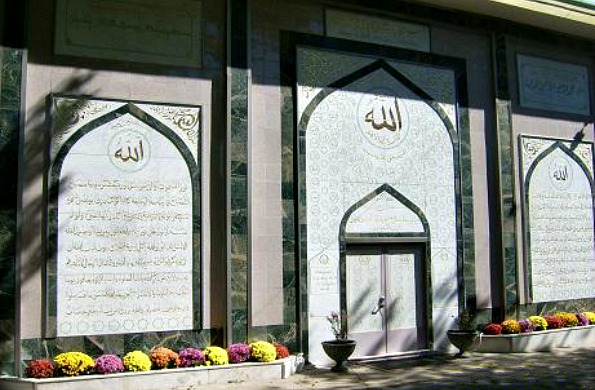“Every word must end in God, every breath must end in Him. Man’s entire life must reach God; that is his true prayer. That is the culmination of the prayer of the Sufi. One who attains the clarity of perfect faith is called a Sufi.” ~M.R. Bawa Muhaiyaddeen
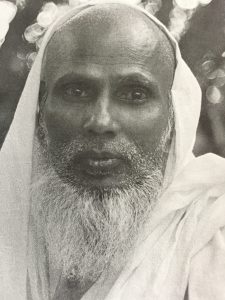
Muhammad Raheem Bawa Muhaiyaddeen
Before sharing about this experience, it is important to understand a bit of Islamic history. The Islamic faith has many different offshoots, with three main branches.
The first two of these, Sunni and Shi’ite, compose the majority of the Islamic or Muslim faith. In theology, these two faiths are much the same. Both sides agree that Allah is the one true God and that Muhammad is his messenger. The division occurred when the Prophet Muhammad died. Who should be his successor, or Imam?
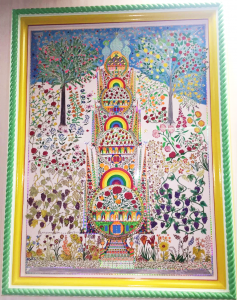
Bawa’s original art and poetry hangs throughout the Bawa Muhaiyaddeen Fellowship.
Shi’ite Muslims believe that Muhammad’s successor should be someone of his bloodline. Muhammad’s son-in-law and cousin, Ali ibn Abi Talib, became the Imam (leader). His followers are Shi’ites, a contraction of the phrase ‘Shiat Ali’, followers of Ali.
Sunni Muslims are sometimes referred to as orthodox, or traditional Islamic followers. Sunnis believe that being a pious individual who follows the Prophet Muhammad’s teachings is more important in an Imam than bloodline. Sunnis are the largest denomination of Islam, making up almost 90% of those of the Islamic faith tradition.

Bawa passed away in December 1986, his belongings are kept as he kept them for all to see.
The remaining offshoot of the Islamic faith are those of the Sufi tradition. This is the Muslim tradition that we are exploring in our visit. Sufis are Islamic Mystics. Sufis are not focused on the traditions, bloodline, or external requirements of Islam. Instead, Sufis seek a personal experience with God through meditation. Most Sufis also claim membership within the Sunni and Shi’ite traditions in addition to their focus on personally discovering God within themselves.
Muhammad Raheem Bawa Muhaiyaddeen is a Sufi saint from Sri Lanka. He taught for forty years in Jaffna, Sri Lanka, before coming to Philadelphia in 1971. He taught followers of all faiths from his home, through songs, stories and sermons, until his death in December 1986.
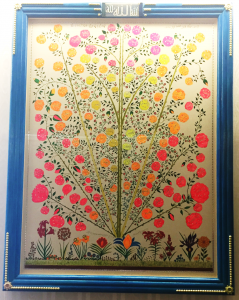
Bawa’s original art and poetry hangs throughout the Bawa Muhaiyaddeen Fellowship.
His home, the Bawa Muhaiyaddeen Fellowship, continues to be a place of worship. Here, the mystical teachings of Bawa are shared through his translated writings, audio tapes, and his original artwork, which adorns walls throughout the location.
All of the women of the Philadelphia Interfaith Visionary Women’s Council quietly remove their shoes before entering. Similar to our experience in the Sikh Society, we are greeted with a warm vegetarian meal served by women of the Sufi Muslim faith. Reinforcing the truth, that there is more uniting our faiths than dividing us, the Sufi faith also believes that when a person is hungry, they cannot learn spiritual truth.
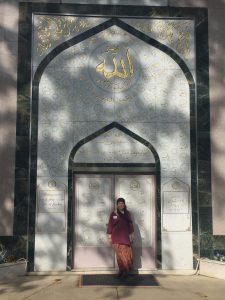
Ayesha Weinberg stands in front of the Bawa Muhaiyaddeen Fellowship mosque entrance.
Bawa’s followers, Ayesha Weinberg and Suhaiba Toomey share with us their personal experiences with Bawa and his teachings. As they share, their great love and admiration for Bawa are palpable and leads me to ask if they worship Bawa.
Ayesha’s response is beautiful, “We do not worship Bawa; there is only God. But we have great love and respect because he awoke God within us. Bawa was a signpost pointing us to God within us. He truly practiced what he preached. He showed us the potential for the exalted within each of us.”

Worshipers wash their bodies free of sin before going in to pray.
Following the history and teachings, Ayesha takes us on a tour of Bawa’s personal living space in the Fellowship. The love for their leader is clear in the respectful way they have preserved every aspect of his living space, even including dishes of candy in honor of his love for sweets!
Suhaiba then takes us into the women’s washing room. Here, every part of the body that will touch a prayer mat is made clean. These ablutions are to wash away all the evil ears have heard, evil the mouth has spoken, and evil hands have done to make all clean before God. I find this a beautiful ceremony to prepare one’s mind before prayer.
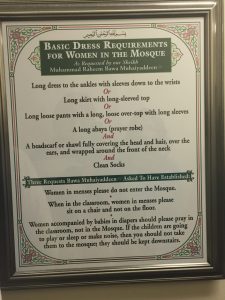
Posted outside the women’s wash area. These are the dress requirements for women of the Sufi faith.
We cover our heads in respect to the posted rules, before proceeding to the prayer space. A narrow staircase leads us up into a large, domed room, empty of all furniture, save dividing lace curtains, separating the men’s side and women’s side and a large piece of furniture on the men’s side, called a mimbar. The mimbar is used as a prayer pulpit during Friday evening prayers. Although there is not much to see on the ground, the domed ceiling above is outlined by a circle of pink windows, each emblazoned with one of the 99 names of God in the Islamic tradition.
We enjoy a final moment of peaceful reflection before wrapping up our visit to the Bawa Muhaiyaddeen Fellowship.
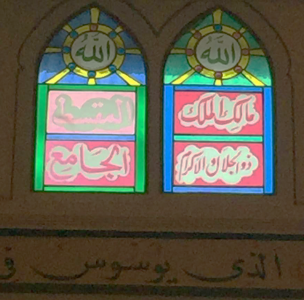
The 99 names of God are emblazoned in windows encircling the dome in the prayer space.
In Bawa’s teachings, “Islam and World Peace; Explanations of a SUFI”, it states:
The light of Islᾱm should reveal the essence of God in every life. If we see that essence, then we will live in unity; we will eat from the same plate; we will live as one family whether some are in a church, some are in a mosque, or some are in their homes. The beggar and the king will be able to pray together. We will discover our own faults, discard our own anger, and embrace one another with love. That is what the Qur’ᾱn says. That is why we cannot tell lies, indulge in treachery, or threaten to kill other lives and claim that it is being done in the name of Islᾱm. Islᾱm teaches that we must recognize and praise the essence of God as it exists in each and every life.
We must recognize and praise the essence of God as it exists in each and every life.
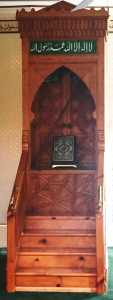
Mimbar where leader stands during Friday evening prayers.
What a wonderfully respectful way to view each person we come into contact with! Not as someone we need to force to agree with us. Not as someone we need to compete with. Rather as someone we should be seeking to see God within. In my own faith, we believe that each of us is a child of God, with divinity within each of us. Sometimes, I forget to look for that divinity as I go through my daily routine. Learning of this Sufi belief makes me remember to look for that divinity and to help the other person see the divinity within through how I treat them.
In each of these visits to different faiths over the last months, I re-examine my own beliefs through the perspective of their faith. Each time, I have grown closer to God and I have deepened my own appreciation for my own Mormon faith. Truly setting aside my own prejudices and preconceived ideas, and simply coming to learn and listen to each faith’s teachings, I am better following the teachings found within my own faith.
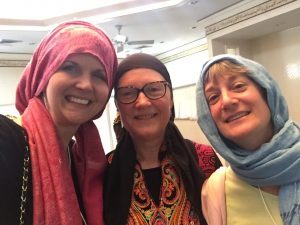
Myself, Suhaiba Toomey, and Natalie Katz.
I am living the teachings of Jesus Christ, “Judge not, that ye be not judged.” Matthew 7:1 when I focus on Bawa’s teaching to live in unity and to focus on my own faults.
Meditating on Bawa’s teaching of embracing one another with love, I also keep Christ’s command:
A new commandment I give unto you, that ye love one another; as I have loved you, that ye also love one another. ~John 13:34

